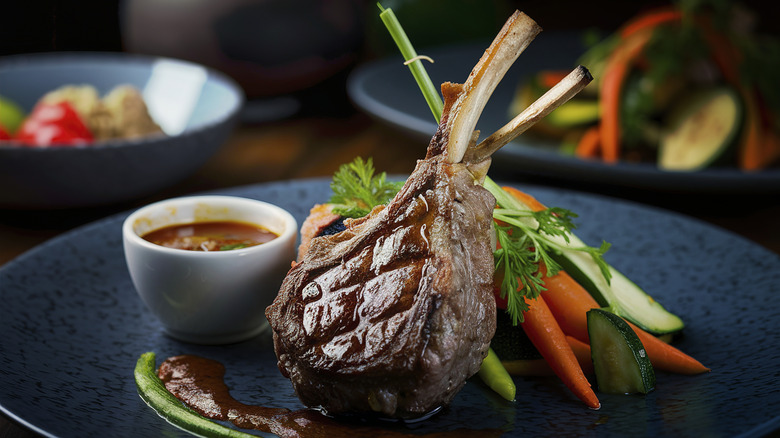The One Thing You Should Never Do With Your Bone-In Meat At Steakhouses
A trip to a good steakhouse, whether it's a high-end place or one of the best steakhouse chains, is a time to embrace the fanciness of proper etiquette. Sure, it's fun to spear a steak with a fork and rip chunks off with your teeth instead of daintily cutting it. But the careful, slow-moving attention you pay your food with proper etiquette is an excellent way to ensure you've savored every last bite.
Proper etiquette is especially important when you order a steak that still has the bone. It doesn't matter if it's a small bone-in ribeye, a T-bone (or its made-for-two big brother the porterhouse), or a mammoth tomahawk. Once you've had your fill, and you're staring at that mighty tasty-looking bone, with all its scraps of delicious beef still clinging to it, you must resist the urge to gnaw on it. It is not the compliment to the chef you may think it is. If resistance feels futile, instead ask the steakhouse to package it up for you. Tell them it's for your dog if you feel strange asking for just a bone to-go. But don't actually give it to your dog since cooked bones can shatter and cause serious damage.
How to eat bone-in meat at a steakhouse
There's a little more to ordering a bone-in steak than just not gnawing on the bone. You also need to cut it properly for an optimal experience. First, start by separating the bone and the steak by cutting closely along the bone, then pulling the meat away. Before you go cutting pieces off to eat, though, double-check the doneness of the meat that was just touching the bone. This meat will be slightly less cooked than the rest of the steak because bone insulates it, so if it's a little more rare than you asked for, then the steak proper is likely perfect.
With the meat separated and the doneness checked, you can start slicing off bites to eat. Don't cut everything up at once (that's another etiquette faux pas), just cut off one bite at a time. Additionally, make sure to cut every bite of meat against the grain. This makes for more tender bites by shortening the muscle fibers in the meat.

